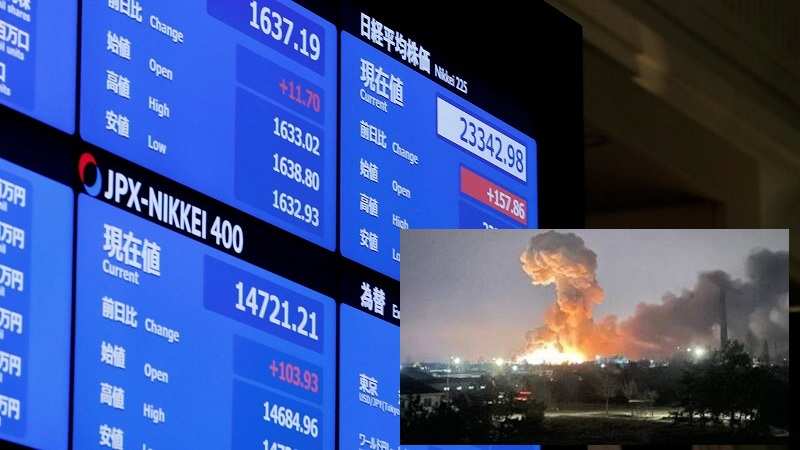Tokyo Stock Exchange Plunges After Russia’s Putin Invades Ukraine

On Thursday, the Nikkei stock market index fell below 26,000 for the first time since November 2020, as Russian President Vladimir Putin announced a special military campaign in eastern Ukraine.
The Nikkei Stock Average, which has 225 issues, fell 478.79 points, or 1.81 percent, to 25,970.82, its lowest closing level since Nov. 20, 2020. The Japanese financial markets were closed for a national holiday on Wednesday.
The Tokyo Stock Exchange’s wider Topix index of all First Section stocks closed 23.50 points, or 1.25 percent, down at 1,857.58. Air transportation, rubber products, and glass and ceramics difficulties were the biggest detractors.
Investors sought the perceived safety of the yen after events in Ukraine, traders said, and the dollar slipped to the mid-114 yen area from around the 115 yen line.
Tokyo equities extended their five-session losing run as the market remained under pressure due to fears about Ukraine. Following news that Moscow had initiated a military campaign in Ukraine, the Nikkei index plummeted in the afternoon, briefly shedding nearly 600 points.
Expectations that Moscow’s military intervention would hamper Russia’s energy supplies caused crude oil prices to skyrocket. For the first time since September 2014, benchmark Brent oil futures momentarily crossed $100 per barrel.
“Following the disclosures, market players became more risk apprehensive. As long as the situation remains ambiguous, the Nikkei index might lose further ground as fresh developments emerge “NLI Research Institute’s chief equities strategist, Shingo Ide, stated.
Investors, according to Ide, are concerned that ongoing geopolitical tensions will fuel inflation as crude oil prices rise higher.
“Investors are concerned that rising energy prices would cause the economy to cool. Another fear is that the Federal Reserve of the United States may substantially tighten its monetary policy in response to a probable spike in inflation “Ide said.
Putin’s pledge of a “special military operation” in eastern Ukraine came despite last-minute pleas from Western countries to avoid a conflict in Europe’s heartland.
Fears of a large-scale Russian invasion and its impact on the global economy have rocked major financial markets around the world, with the Dow Jones Industrial Average falling for the fifth day on Wednesday.

Declining issues outnumbered advancers 1,294 to 824 in the First Section, with 64 issues ending unchanged.
Rubber product issues were weak due to fears that increasing raw material costs would hurt the rubber industry’s bottom line.
Bridgestone slid 266 yen, or 5.4 percent, to 4,682 yen, while Yokohama Rubber fell 80 yen, or 4.7 percent, to 1,615 yen.
According to brokers, certain technology-related stocks declined due to losses on the Nasdaq index in the United States. Fanuc, a producer of industrial robots, sank 1,160 yen, or 5.4 percent, to 20,255 yen, while Screen Holdings down 590 yen, or 5.4 percent, to 10,320 yen.
The main section’s trading volume increased to 1,594.12 million shares from 1,138.93 million shares on Tuesday.
Fears of a full-scale invasion in eastern Europe rose after Russian President Vladimir Putin ordered a “military action” in Ukraine. Tokyo equities finished substantially down on Thursday (Feb 24).
The Nikkei 225 index slid 1.81 percent to 25,970.82, or 478.79 points, while the broader Topix index declined 1.25 percent to 1,857.58 points.
During afternoon trade, market expert Hirofumi Yamamoto of Toyo Securities told AFP that Putin’s remark “is spurring additional selling” by investors seeking short-term gains.
“However, if the situation does not escalate into a Russian occupation of all of Ukraine, the market is unlikely to deteriorate,” he continued.
According to AFP journalists, more headlines came in during late Tokyo trading as explosions were reported in Ukraine’s capital, Kyiv, and many other places.
